Malapilla (1938)
Director: Gudavalli Ramabrahmam; Writer: Gudipati Venkatachalam, Tapi Dharma Rao; Producer: Yarlagadda Sivaramprasad, Challapalli Raja; Cinematographer: Sailen Bose; Editor: Dharamvir Singh; Cast: Govindarajula Subbarao, Kanchanamala, Sundaramma, P. Suribabu, Gaali Venkateswara Rao, Vangara Venkata Subbaiah, M.C. Raghavan, Hemalatha Devi, P. Gangaratnam, Lakshmikanthamma, Teku Anasuya, Puvvula Anasuya, Paluvayi Bhanumathi, Puvvula Suryaprakasam, Narasimha Murthy, Seshaiah, Basavaiah Chowdary
Duration: 02:28:12; Aspect Ratio: 1.379:1; Hue: 97.304; Saturation: 0.018; Lightness: 0.317; Volume: 0.116; Cuts per Minute: 9.837

censor certificate

1. Dedicated to Kasinadhuni Nageshwara Rao Pantulu (1867-1938), departed Andhra leader. He was the president of the Harijan Sevak Sangh in Andhra, and founder-editor of the influential nationalist newspaper Andhra Patrika in which many social and political debates were published. He was one of the founders of Andhra movement (for a separate Andhra state from the Madras province) which earned him the title “desoddaaraka (savior of the Andhra nation).” He was also a prominent industrialist—he founded the pain-balm manufacturing company Amrutanjan Limited in 1893.

Actors: P. Suribabu
Lyricist: Basavaraju Apparao
Music: Bhimavarapu Narasimha Rao
Singer: Chorus
Singer: P. Suribabu
Song: Lera Lera Niddura Maanaraa Harijana Veera Kumaraa
లేరా లేరా నిద్దుర మానరా హరిజన వీర కుమారా
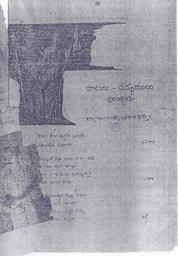

2. The film opens with a song sung by Congress volunteers marching through a mala (untouchable) village in the morning, inviting the malas to come for a Congress meeting. The gist of the song: “O brave harijan youth! Stop sleeping and wake up! Human beings have ill-treated you and made you untouchables. But enough! Come, join the movement of Mahatma Gandhi who has dedicated his life to fighting this evil. If you join, who can stop you?!”

3. Nagaraju, an educated young brahmin and son of the chief pujari Sundararama Shastry, is going with a camera to the Congress's anti-caste meeting. Near the pond he is met by Sharma, another brahmin, who asks him whether his father had not told him of the decision taken at his own house by the brahmin community to boycott the anti-caste meeting. Nagaraju is surprised to hear this and decides to go back.

4. The meeting of the Harijan Sevak Sangh is attended mostly by malas. The chairperson quotes Gandhi as saying that untouchability is a blot on Hinduism, that the Congress’ fight against untouchability is a fight for righteousness and justice, and that the untouchables too should join in the fight for their rights. The local Congress leader Chaudhary praises the king of Travancore for allowing harijans to enter temples, and sings a well-known nationalist song. A Congress poster proclaims that Hindu society will not give up its 7 crore harijan members. There is also an election poster of the Justice Party. Chaudhary says that social change should come about through change of hearts, not through violence. He and his companions would work in the village for this purpose with Gandhi’s blessings.

Gandhi
Indian National Congress

Actors: P. Suribabu
Lyricist: Tapi Dharma Rao
Music: Bhimavarapu Narasimha Rao
Singer: P. Suribabu
Song: Praayamunandu Pinna Prathibhaa Vibhavambuna Minna (Padyam)
ప్రాయమునందు పిన్న ప్రతిభా విభవంబున మిన్న
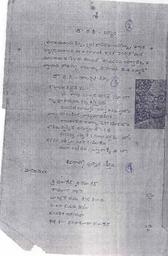

Actors: P. Suribabu
Lyricist: Basavaraju Apparao
Music: Bhimavarapu Narasimha Rao
Singer: P. Suribabu
Song: Kollaayi Gattite Nemee Maa Gandhi Maaladai Thirigithe Nemee
కొల్లాయి గట్టితే నేమీ మా గాంధి మాలడై తిరిగితే నేమీ


5. The malas praise Gandhi and the king of Travancore because of whom they too could pray at God’s temple. Muniah, a mala elder, says: “Tomorrow is Shivarathri (=festival for lord Shiva). We too will go to the temple.” Nagiah, an aggressive young mala, points out that the brahmins would not allow this. Muniah replies: “If one doesn’t ask, even one’s mother doesn’t give anything. So let’s go and ask.” His friends feel that at least Muniah, if not all malas, should be allowed to enter the temple.

6. The brahmins are upset by the developments in the village, and blame it all on Gandhi and the meeting which has made the untouchables arrogant. “The Congress feels that the whole universe is one and everyone is equal. But how can the lion and the ant be equal?” They are incensed when they see a mala walk past holding an umbrella, and ask him if he has forgotten his place and has begun to eye the sky. When he replies that he’s carrying the umbrella because it had been raining for three days, Sharma thrashes him with his sandal.

Lyricist: Tapi Dharma Rao
Music: Bhimavarapu Narasimha Rao
Singer: Chorus
Song: Jai Mahadev Jai Mahadev Kaamahara Apara 1
జై మహదేవ్ జై మహదేవ్ కామహరా అపరా


7. The malas march towards the Shiva temple on the morning of Shivarathri. Glimpses of a wide range of communities that make up Indian society are seen, ranged between the marching untouchables and the upper castes praying in the temple. When a fight threatens to break out between the brahmins and the untouchables, the Congress volunteers led by Chaudhary intervene and stop the malas from forcing their way into the temple.
8. Muniah’s daughters Champalata and Anasuya prance to their cave temple, teasingly singing a song in praise of lord Krishna, the dark-skinned son of a cowherd. The viewer can make out that their song also refers to Nagaraju who is pursuing them unobserved. Inside the cave temple, Nagaraju and the sisters are at first shocked to discover that they belong to different castes, but soon find a common reference point in lord Krishna who hates neither brahmins nor malas. Nagaraju too sings a song praising Krishna.
9. Unseen by them, Nagiah (who loves Champa) enters the cave and eavesdrops. Champa tells Nagaraju that the sweetness of his song haunts her—would he teach her to sing and attain the unreachable heights of ecstacy? Nagaraju touches her fondly, but she darts away exclaiming: “Dreams! It is not right for a brahmin to touch a mala.” She is infuriated to discover Nagiah eavesdrop and screams: “Haven’t I told you before not to touch me?!” Nagaraju comes and slaps Nagiah: “Have you no shame, you brute, fool!” Nagiah goes away telling Champa not to entertain mindless hopes and that he would marry her.
10. At a meeting of the brahmins, there is consternation about the new social changes. “First malas (outcastes), then panchamas (=fifth caste), next adiandhras (=original inhabitants of Andhras), and now harijans (=children of god)—to what status will they be elevated next?” “As brahmins next to god perhaps!” Congressman Chaudhary tells them that the malas are feeling especially militant after one of them was recently beaten with a sandal. He reasons with the brahmins about the need to reform Hindu society: “The supremacy of brahminism is over. Adapt yourselves to the new circumstances if you wish to flourish. If you want to live peacefully and happily, learn to give and take. If you won’t let them into the temple, at least permit them to drink from the ponds and walk on the streets.” But Shastry is adamant that such permissiveness would destroy Hinduism, and therefore also the nation, independence, even the malas themselves. Moreover: “I (and the brahmin community) have earned spiritual wealth through centuries of pious deeds, devotion, and sacrifices, and will not share this wealth with these dogs.” Shastry threatens to refuse malas access to even the sole pond from which the whole community got its drinking water.
11. Chaudhary returns to the Congress office and reports to his colleagues that his talks with the brahmins have failed and that Shastry has appointed a watchman to prevent the malas from drawing drinking water from the pond. Chaudhary counsels that they should carry on with other constructive activities rather than contemplate or instigate a forceful reaction. An impatient Congressman suggests sarcastically that they should all wear bangles and sit at home spinning on the charkha—a Congresswoman demands that he withdraw that offensive remark.
12. The watchman at the pond prevents malas from taking drinking water from the pond. There is a thunderstorm, and the malas go to request Shastry to relent but the latter is busy with his prayers and keeps them waiting in the rain. Nagiah is furious: “Are we animals? These brahmins do nothing but eat and pray—that is their karma. Our karma is to produce and starve. But if we decide this karma can be reversed. We should just take over everything and send these people away. Even god sits in the brahmin’s house happily eating prasad and doesn’t bother about us.” Muniah tells him not to blame god for the evils committed by these villains. They go home, and are forced to drink water from a dirty pond. They plead again with Shastry who declares: “My final word is that as long as I am alive, caste and religious dharma will also be alive.” Muniah says that Shastry should fight for dharma, not commit adharma by stopping people from drinking water: “If our women and children suffer, your women and children too won’t be safe. For ages, you have abused us as beasts; now we won’t hesitate to act like beasts.” Nagiah tells Shastry that he should get his son married soon.
13. Soon, the malas start falling ill by drinking dirty water. An angry Nagiah declares the time has come to forcibly take pure water, but Muniah stops him. At this Nagiah and his friends call Muniah a traitor and a muni (=sage) who worships god, cow, etc., and who even sends his daughter to please the brahmins. A shocked Muniah demands an explanation and Nagiah tells him to come and see what his daughter is up to. Champa is with Nagaraju, talking about the impossibility / unjustness of love between a brahmin and a mala, while Anasuya prays to Krishna. Nagaraju tells Champa that when their minds can become one, why should their bodies remain separate. Through a song he suggests that they should become one like the clouds uniting in the sky, the treetops that merge to form a forest, and the waterfalls that join to become a river. Muniah and the other malas arrive and confront the lovers. An irate Muniah asks Nagaraju whether he couldn’t find any women at home that he is after a dirty untouchable girl, and whether brahmins didn’t find mala women’s chastity untouchable: “Your father harasses our women and children (by refusing us water), and you harass us like this.” Champa is shocked to learn that Nagaraju is the son of Shastry and accuses him of hiding this from her. She promises her father never to see Nagaraju again. Nagiah suggests that he is ready to marry her.
13. Soon, the malas start falling ill by drinking dirty water. An angry Nagiah declares the time has come to forcibly take pure water, but Muniah stops him. At this Nagiah and his friends call Muniah a traitor and a muni (=sage) who worships god, cow, etc., and who even sends his daughter to please the brahmins. A shocked Muniah demands an explanation and Nagiah tells him to come and see what his daughter is up to. Champa is with Nagaraju, talking about the impossibility / unjustness of love between a brahmin and a mala, while Anasuya prays to Krishna. Nagaraju tells Champa that when their minds can become one, why should their bodies remain separate. Through a song he suggests that they should become one like the clouds uniting in the sky, the treetops that merge to form a forest, and the waterfalls that join to become a river. Muniah and the other malas arrive and confront the lovers. An irate Muniah asks Nagaraju whether he couldn’t find any women at home that he is after a dirty untouchable girl, and whether brahmins didn’t find mala women’s chastity untouchable: “Your father harasses our women and children (by refusing us water), and you harass us like this.” Champa is shocked to learn that Nagaraju is the son of Shastry and accuses him of hiding this from her. She promises her father never to see Nagaraju again. Nagiah suggests that he is ready to marry her.
14. The brahmins and the other dominant-caste landowning ryots (belonging to the kamma caste, to which Chaudhary and most of his associates belong) are disturbed by the news that the malas plan to boycott work and are even prepared to starve to death. They feel that the Congress is the root of the trouble, and persuade the owner of the house rented by Chaudhary to evict him. The kammas threaten to excommunicate Chaudhary. Chaudhary and his colleagues decide to go and live with the malas to prove that they too are human.
15. Nagaraju is tormented at his separation from Champa. His conscience tells him to immediately go and marry her, but he is also wracked by the implications of marrying a mala. As if answering his questions, the Congress volunteers march past his house singing: “Aren’t malas too human beings? Haven’t great people been born amongst them too? What will happen if 7 crore harijan leave Hinduism; will Hinduism survive?” They arrive at the mala village and declare that they plan to stay there. Some malas fear this could lead to trouble, but Nagiah asks what worse trouble could malas face. Chaudhary reveals the new plan of action—he tells the malas not to work for the dominant-castes: “It would mean more trouble from them, but be determined in your righteous fight against injustice. No violence. And tell malas from neighbouring villages not to come here and work for those who oppress you.” A Congresswoman sings a “strike song” urging all workers to unite and fight for their rights.
16. The strategy seems successful. Soon, the crops are ready for harvest but nobody is there to do the work, not even the neighbouring villagers. The ryots are willing to negotiate through the Congress on the mala demands, but Shastry is unrelenting in his defence of dharma. When Nagaraju asks him (and the viewer knows the son’s personal stake in the question) whether dharma would get spoiled by contact, the father says it would. N: “But that hasn’t been the case anywhere else in the world, father.” S: “Hinduism is different. People who only read English cannot understand this. Study well, my son, and refute such people with your vedic knowledge.” Nagaraju is unconvinced. Meanwhile, for the sake of her ill mother, Champa tries to take pure water from the pond. The watchman makes overtures to her. A Congresswoman tries to take water on her behalf but the watchman stops her. Nagaraju rushes there and beats the watchman with his sandal. The Congress volunteers begin distributing pure water to the malas. The watchman tells Shastry: “Your son hit me.” S: “Good! Why?” W: “He wanted to give water to that mala girl. He loves her.” Shastry is shocked to her this and tells the watchman to keep quiet about this. Shastry and Nagaraju discuss and disagree about the latter’s “friendship” with Champa. Nagaraju’s mother too is upset when she hears about the matter and suggests that he could continue his affair with Champa in secret but should not marry her. But Nagaraju meets Anasuya and tells her that he wants to marry Champa. The sisters go to their cave temple at night. When they return the next morning, the furious Muniah tells Champa to leave his home. She seeks refuge with Nagaraju, but he is rattled at the thought and does not let her enter his house. She hears him describe her as “some beggar woman” to his friends and is heartbroken. Anasuya brings her back home but Muniah drives her out again. Nagaraju too is tormented by his conscience, and realizes that he must not abandon her no matter what. He elopes with Champa to Calcutta, accompanied by Anasuya.
17. The Congress volunteers are decide that the malas need to give up their “uncivilised” practices like worshipping false gods (Potharaju, Puleramma), drunken revelry, animal sacrifice, etc. A group of Congress volunteers disrupt a mala festival and a Congresswoman denounces the practice. A drunken mala comments on her looks and says that if she were from his caste he wouldn’t mind marrying her. He throws a pot of toddy at her and injures her. Chaudhary arrives and criticizes the malas: “You people never change. It is precisely because of your unruly dancing, drinking, violence and animal sacrifice that you are regarded as polluted and untouchable. This is why others don’t respect you and why you don’t have proper clothes, food, homes and remain poor.” The malas say that they took out their jatra (=procession) because they were not allowed into the temple by the dominant castes. Chaudhary tells them to give up drinking and animal sacrifice in any case. Muniah’s wife rushes there and screams that Nagaraju has abducted both her daughters. The angry malas run towards Shastry’s house and threaten to attack him if he doesn’t turn his son over. Chaudhary intervenes and gets injured. He persuades the malas to calm down and go back.
18 Nagaraju, Champa and Anasuya reach Calcutta. Anasuya is hit by the car of a rich industrialist named Bose and is treated at his house. Bose is a nationalist, and is impressed by Nagaraju’s courageous decision to marry an untouchable—he offers him a lucrative job as his personal assistant, and Nagaraju makes the most of this opportunity. Champa and Anasuya are bowled over by the facilities and possibilities of modern living in the city, and are suddenly in awe of what the transformed Nagaraju achieves for himself (and them?). Nagaraju writes to his father that he has decided to marry Champa.
19. Shastry is furious, declares that as far as he is concerned his only son is dead, and literally washes his hands off him. His wife is shocked to hear this. Meanwhile, Chaudhary has been pacifying the two families: he tells Muniah that Nagaraju is a good man and would take good care of his daughters; he tells Shastry that Nagaraju’s decision not to abandon his mala lover was rare and an exemplary act of the new nationalism. Shastry’s house catches fire, and the malas led by Muniah and Nagiah save the life of Shastry’s wife—while the other brahmins exult that this was only the beginning of the expression of divine displeasure over Nagaraju’s act. Chaudhary counsels Shastry to be proud of his unique and ideal son. He says that cheats and crooks are the real untouchables. He also requests Shastry to allow the malas to enter into his temple after proving that there is no basis for untouchability in the sacred texts (which describe all castes as kin), and pointing to the noble example set by the maharajas of Travancore and Indore who had permitted the entry of untouchables into the temples in their kingdom. When Chaudhary also produces a new government order that temples cannot practice caste discrimination, Shastry is finally persuaded and declares that he would open up his temple.
20. This is widely reported in the press, and elicits three reactions: Chaudhary sends a message to the police to provide security for the occasion; Nagaraju decides to come home to Bezwada (Vijayawada) with Champa and Anasuya; and the conservative brahmins attempt to attack Shastry for betraying dharma. Shastry states that he understands what dharma is and has also been authorized by the Government—they could go to court if they had any objection. They retort that the court is in their (brahmins’) hands, to which the malas respond by saying that they too have the court on their side. A fight threatens to break out between these brahmins and the malas and Congress volunteers who are on Shastry’s side. The police arrive and on the instruction of Chaudhary arrest the unruly brahmins.
21. Nagaraju and Champa get married. The Congress declares to the gathering that it is a great event not just for the village or the district or the Andhra territory but for the whole of India. Shastry is warmly congratulated for his decision and compared to the maharajas of Travancore and Indore. Shastry passes on the credit to Chaudhary who, in his turn, says that everything was achieved due to the greatness of leaders like Gandhi and Kashinatha Nageshwara Rao [to whom the film Malapilla is dedicated] as well as due to the spirit of Hinduism. Everybody enters the temple and pray together, with Nagaraju and Champa achieving iconic status in the final sequence. The film ends with a picture of the Congress flag filling the screen.

Actors: Kanchanamala
Actors: Sundaramma
Lyricist: Basavaraju Apparao
Music: Bhimavarapu Narasimha Rao
Singer: Kanchanamala
Singer: Sundaramma
Song: Nallavaade Golla Pillavaade
నల్లవాడే గొల్లపిల్లవాడే
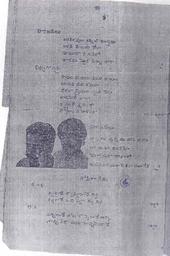

Actors: Gaali Venkateswara Rao
Lyricist: Jayadeva Kavi
Music: Bhimavarapu Narasimha Rao
Singer: Gaali Venkateswara Rao
Song: Saavirahe Thavadeena Krishna Saavirahe Thavadeena
సావిరహే తవదీనా కృష్ణా సావిరహే తవదీనా
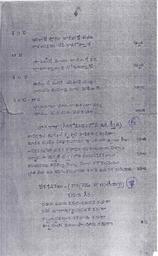

Lyricist: Basavaraju Apparao
Music: Bhimavarapu Narasimha Rao
Singer: Chorus
Song: Vaduku Vaduku Kadhura Vadakave Kadhuraa
వడుకు వడుకు కదుర వడకవే కదురా


Actors: Gaali Venkateswara Rao
Actors: Kanchanamala
Actors: Sundaramma
Lyricist: Basavaraju Apparao
Music: Bhimavarapu Narasimha Rao
Singer: Gaali Venkateswara Rao
Singer: Kanchanamala
Singer: Sundaramma
Song: Venu Manohara Gaanamu Ne Nee Velanu Nochaga Ledha
వేణు మనోహర గానము నే నీ వేళను నోచగ లేదా
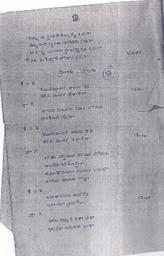

Actors: Sundaramma
Lyricist: Basavaraju Apparao
Music: Bhimavarapu Narasimha Rao
Singer: Sundaramma
Song: Nischala Satyamutho Jathagurchina (Padyam)
నిశ్చల సత్యముతో జతగూర్చిన
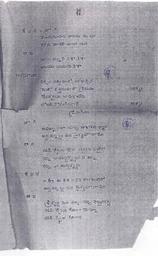

Actors: Gaali Venkateswara Rao
Actors: Kanchanamala
Actors: Sundaramma
Lyricist: Basavaraju Apparao
Music: Bhimavarapu Narasimha Rao
Singer: Gaali Venkateswara Rao
Singer: Kanchanamala
Singer: Sundaramma
Song: Aa Mabbu Ee Mabbu Aakasha Madhyaana
ఆ మబ్బు ఈ మబ్బు ఆకాశ మధ్యాన


Actors: P. Suribabu
Lyricist: Tapi Dharma Rao
Music: Bhimavarapu Narasimha Rao
Singer: Chorus
Singer: P. Suribabu
Song: Maalalu Maatramu Manushulu Kaaraa
మాలలు మాత్రము మనుషులు కారా
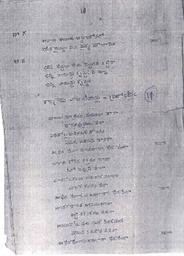

Lyricist: Tapi Dharma Rao
Music: Bhimavarapu Narasimha Rao
Song: Kooleelandaru Yekamu Kaavaleraa Pedhala Aakali Dharuna Bhadhanu
కూలీలందరు ఏకము కావలెరా పేదల ఆకలి దారుణ బాధను
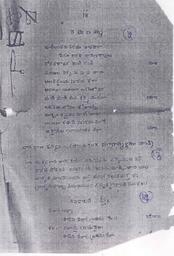

Actors: Kanchanamala
Lyricist: Basavaraju Apparao
Music: Bhimavarapu Narasimha Rao
Singer: Kanchanamala
Song: Ledha Aasha Paapini Nena Brathukinkela
లేదా ఆశా పాపిని నేనా బ్రతుకింకేలా


Lyricist: Basavaraju Apparao
Music: Bhimavarapu Narasimha Rao
Singer: Chorus
Song: Jathara Sethamuraa Devatha Jathara Sethamura
జాతర సేతమురా దేవత జాతర సేతమురా
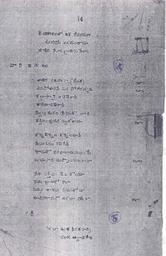

Actors: P. Suribabu
Lyricist: Tapi Dharma Rao
Music: Bhimavarapu Narasimha Rao
Singer: P. Suribabu
Song: Ee Thraagude Gadha Intha Neechatha Goorchi Kooduguddalaku
ఈ త్రాగుడే గదా ఇంత నీచత గూర్చి కూడుగుడ్డలకు


Actors: P. Suribabu
Lyricist: Basavaraju Apparao
Music: Bhimavarapu Narasimha Rao
Singer: P. Suribabu
Song: Manujula Vibhajanamelaa Leni Bhedamulelaa
మనుజుల విభజనమేలా లేని భేధము లేలా

Actors: P. Suribabu
Lyricist: Tapi Dharma Rao
Music: Bhimavarapu Narasimha Rao
Singer: P. Suribabu
Song: Leve Perunakenniyo Mathamulu (Padyam)
లేవే పేరున కెన్నియో మతములు

Lyricist: Tapi Dharma Rao
Music: Bhimavarapu Narasimha Rao
Singer: Chorus
Song: Jai Mahadev Jai Mahadev Kaamahara Apara 2
జై మహదేవ్ జై మహదేవ్ కామహరా అపరా
Indiancine.ma requires JavaScript.